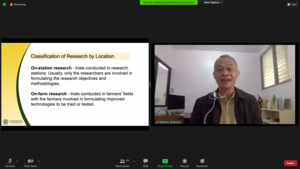
Aiming to train and prepare Aurora State College of Technology’s (ASCOT) faculty members on writing an effective Research Proposal, the College’s Research and Development Services office held a two-day virtual Training-Workshop on Research Proposal Writing via Zoom, January 28-29.
Discussing different topics and sharing different strategies and hacks on how to write a good research proposal, Dr. Rotacio S. Gravoso, Professor from Visayas State University shared knowledge about “Conceptualizing Research”, “Writing the Introduction and Objectives”, “Reviewing the Literature”, and “Preparing the Methods Section” which focused on social science research and covered theoretical and conceptual framework, measurement of variables, research designs, data gathering, ethical consideration, and data analysis.
In his speech during the opening program of the said training, Dr. Eutiquio L. Rotaquio, Jr., College President emphasized the importance of researching the College’s faculty members not only for promotion and compliance among employees but also to become their legacy in coming up with new information and knowledge for the next generation when the time comes.
Dr. Rotaquio also stressed the characteristics of an effective research wherein its results and outcomes must solve specific problems and issues that affect the College and even the whole community.
Meanwhile, in his message; the newly installed Vice President for Research, Innovation, Extension, and Training – Dr. Eusebio V. Angara encouraged the faculty members who will conduct research and dissertations to find the meaning and relevance of what they are doing not only for their own development but also more importantly for the College.
Dr. Angara also shared with the participants the mission of his office which is to stop, listen, and go to think of the problems. Listen to the ideas of other people and go to do some actions.
After Dr. Gravoso discussed the topics, the workshop concluded with the participants applying their learnings from the said training wherein they virtually shared and reported other participants their respective outputs showing the rough draft of their Introduction, Review of Related Literature, and the draft of their Theoretical and Conceptual Framework, Operational Definition of Terms, and the Methods Section applying the appropriate format in writing a research proposal.
